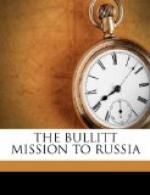and the “rich people” had their own meetings
and meeting places. The popular intention then
was not to exclude the upper classes from the
government, but only from the Soviets, which
were not yet the same. But the Soviets,
once in existence, absorbed in their own class tasks
and their own problems, which the upper class had
either not understood or solved, ignored—no;
they simply forgot the council of empire and
the Duma. And so they discovered (or, to
be more exact, their leaders discovered) that
they had actually all the power. All that Lenin
and the other Socialist leaders had to do to
carry through their class-struggle theory was
to recognize this fact of power and teach the
Soviets to continue to ignore the assemblies and
the institutions of the upper classes, which, with
their “governments,” ministries,
and local assemblies, fell, powerless from neglect.
The Soviet Government sprouted and grew out of the habits, the psychology, and the condition of the Russian people. It fitted them. They understand it. They find they can work it and they like it. Every effort to put something else in its place (including Lenin’s) has failed. It will have to be modified, I think, but not in essentials, and it can not be utterly set aside. The Tsar himself, if he should come back, would have to keep the Russian Soviet, and somehow rule over and through it.
The Communist Party
(dubbed “Bolshevik”) is in power now in
the Soviet Government.
I think it will stay there a long time. What I have shown of the machinery of change is one guaranty of communist dominance. There are others. All opposition to the communist government has practically ceased inside of Russia.
There are three organized opposition parties: Mencheviks, Social Revolutionary Right, and Social Revolutionary Left. The anarchists are not organized. The Social Revolutionary Left is a small group of very anarchistic leaders, who have hardly any following. The Mencheviks and the Social Revolutionaries Right are said to be strong, but there is no way of measuring their strength, for a very significant reason.
These parties have stopped fighting. They are critical, but they are not revolutionary. They also think the revolution is over. They proposed, and they still propose eventually, to challenge and oust the Communist Party by parliamentary and political methods, not by force. But when intervention came upon distracted Russia, and the people realized they were fighting many enemies on many fronts, the two strong opposing parties expressed their own and the public will to stand by the party in power until the menace of foreign invasion was beaten off. These parties announced this in formal statements, uttered by their regular conventions; you have confirmation of it in the memoranda written for you by Martov and Volsky, and you will remember how one of them put




